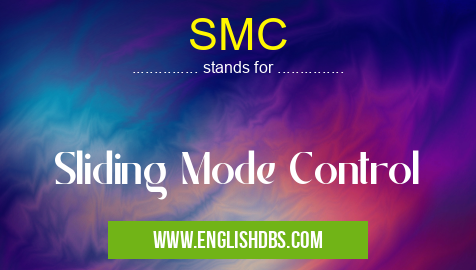What does SMC mean in ACADEMIC & SCIENCE
Sliding Mode Control (SMC) is an advanced control strategy that has been used in many complex systems for decades. It is a type of nonlinear controller which uses discontinuous control signals to provide robust and optimal performance under varying operating conditions. SMC incorporates robustness, high accuracy, fast dynamics, small control signal amplitudes, and disturbance rejection capability into the design.

SMC meaning in Academic & Science in Academic & Science
SMC mostly used in an acronym Academic & Science in Category Academic & Science that means Sliding Mode Control
Shorthand: SMC,
Full Form: Sliding Mode Control
For more information of "Sliding Mode Control", see the section below.
Essential Questions and Answers on Sliding Mode Control in "SCIENCE»SCIENCE"
What is Sliding Mode Control?
Sliding mode control (SMC) is an advanced control strategy that has been used in many complex systems for decades. It is a type of nonlinear controller which uses discontinuous control signals to provide robust and optimal performance under varying operating conditions.
How does Sliding Mode Control work?
Sliding mode controllers use a combination of sliding surface and switching logic to maintain the desired output of a system by acting on the input variables despite noise or changing operating conditions. The combination of sliding surfaces and switching logic ensures that the system operates within boundaries set by the designer.
What are the advantages of using Sliding Mode Control?
SMC offers robustness, high accuracy, fast dynamics, small control signal amplitudes and disturbance rejection capabilities. Furthermore, it requires less computational power than other controllers such as PID controllers and can be applied to both linear and nonlinear systems with minimal tuning requirements.
In what kind of applications can Sliding Mode Control be used?
SMC has been successfully used in many fields such as aerospace engineering, robotics, automotive engineering, medical engineering, electrical engineering, navigation systems etc. where precision control or resilience to noisy environments are important factors in the design requirements.
Final Words:
Using sliding mode controllers can be beneficial when controlling complex dynamic systems requiring accurate performance under variable operating conditions while dealing with disturbances or noise sources present in the environment. Its advantages include robustness, accuracy, fast dynamics and low computational power requirements. Application of this controller has been seen across various elds like aerospace engineering or robotics among others.
SMC also stands for: |
|
| All stands for SMC |
